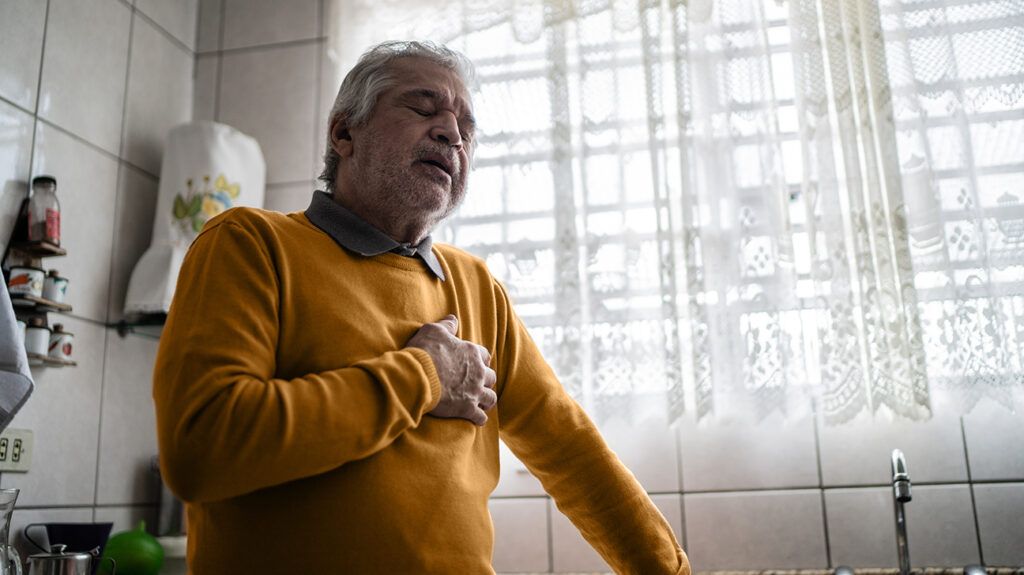Panic attacks and heart attacks have similar symptoms, such as chest pain and nausea. Knowing the signs and symptoms can help you obtain the appropriate treatment.

Heart attacks and panic attacks are two of the main reasons people seek help in emergency departments for chest pain. Panic attacks can feel similar to a heart attack and vice versa, so it may be challenging to know what you’re experiencing.
Learning about the distinguishing differences between a panic attack and a heart attack can help you get the appropriate treatment. Knowing what signs to look for with a heart attack can help save your life.
Understanding the symptoms of panic attacks can help you get the appropriate mental health treatment.
Heart attacks and panic attacks can feel very similar, often with overlapping symptoms. A critical difference between the two is how the pain feels and how long the symptoms last.
They both can occur very suddenly.
Heart attacks
According to the
If you’re experiencing a heart attack, you may have symptoms in the left side of your chest that last longer than a few minutes. The pain may go away and then come back.
The leading cause of heart attacks is coronary artery disease.
The CDC also reports that smoking, high cholesterol, and high blood pressure are three common factors that put you at a higher risk for a heart attack.
Panic attacks
If you have a panic attack, you may also experience chest pain. The chest pain you experience with a panic attack can feel different than that of a heart attack.
Many individuals experience chest pain that feels like a stabbing pain rather than a squeezing sensation present in a heart attack.
2022 research indicates that the onset of panic attacks can occur very suddenly, usually peak within a few minutes. They typically can last up to 20 to 30 minutes.
Many people who experience panic attacks feel very frightened or overwhelmed and may seek help from their primary care provider or go to the emergency room.
The connection between anxiety and heart health
There’s a potential link between the experience of anxiety and panic attacks and the development of heart disease.
A 2018 literature review suggests a 52% increased chance of cardiovascular disease among those experiencing anxiety.
There’s a potential for high rates of cardiovascular events if you live with anxiety. If you’re unsure whether you’re experiencing a panic attack or a heart attack, it’s still best to get it checked out.
If it’s a heart attack, seeking immediate treatment can lessen the damage.
There are various overlapping symptoms of heart attacks and panic attacks. Panic attack symptoms often come on suddenly and peak within 10 minutes.
Heart attacks can occur rapidly and often feel like a squeezing or pressure in your chest.
Heart attack symptoms
Heart attacks occur when your heart isn’t receiving adequate blood flow.
The most common presenting symptoms of a heart attack, also known as acute myocardial infarction, include:
- chest pain
- arm pain
- shoulder pain
- nausea
- weakness
- shortness of breath
A heart attack is a medical emergency. If you believe you or someone you know is experiencing symptoms of a heart attack, time is of utmost importance. Please call 911 immediately to get help.
Panic attack symptoms
Panic attacks can present similarly to heart attack symptoms. Panic attacks occur when an extreme shift to discomfort related to fear occurs. This can feel very overwhelming and may feel like you have a fear of impending doom.
Common symptoms of panic attacks include:
- heart palpitations or increased heart rate
- chest pain
- feeling dizzy or lightheaded
- fear of losing control or dying
- hot flashes or chills
- tingling sensations
- choking sensations
- feelings of detachment from reality
- vomiting or nausea
- shaking or trembling
- shortness of breath
- numbness or tingling
If you live with panic attacks, these can often occur spontaneously, often without a direct cause.
If you’re experiencing panic or heart attacks, it’s essential to seek help. If you’re experiencing chest pain that won’t go away, this is a sign of a heart attack, and you should call 911 immediately.
According to the
- fullness, squeezing, or discomfort in your chest
- jaw, arm, neck, or back pain
- shortness of breath
- nausea or vomiting
- lightheadedness
If you’re experiencing panic attacks, you may need to seek the support of a mental health professional. Panic attacks can feel very overwhelming, and the fear can be intense.
Panic attacks can cause you to live in fear of dying or losing control of your life.
If you’re experiencing panic attacks and want help, you can use the FindCare tool to locate a mental health professional near you.
Heart attacks and panic attacks can feel very similar. The sensations of pain in panic attacks and heart attacks are one of the distinguishing features between the two. Learning the warning signs of a heart attack can help save your life.
If you’re experiencing panic attacks, you might consider seeking the support of a mental health professional. They can help you identify underlying causes of panic attacks and help you cope with anxiety and fear.
If you’re unsure if you’re experiencing a heart attack or panic attack, it’s best to get checked out. The sooner you seek support in the event of a heart attack, the better the potential outcomes can be.
